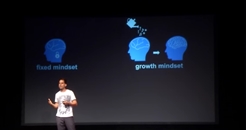 Why mindset matters
Why mindset matters
In 1988, Dr. Carol Dweck, now Professor of Psychology at Stanford University, first presented a research-based model to show the impact of mindsets. She showed how a person’s mindset sets the stage for either performance goals or learning goals. A student with a performance goal might be worried about looking smart all the time, and avoid challenging work. On the other hand, a student with a learning goal will pursue interesting and challenging tasks in order to learn more.
In subsequent studies, Dr. Dweck found that people’s theories about their own intelligence had a significant impact on their motivation, effort, and approach to challenges. Those who believe their abilities are malleable (a growth mindset) are more likely to embrace challenges and persist despite failure.
Why does this matter?
A fixed mindset believes intelligence is static which leads to a desire to look smart, avoid challenges, give up easily, see effort as fruitless, ignore useful negative feedback, feel threatened by the success of others, plateau early and not achieve their potential. A very deterministic view of the world.
A growth mindset on the other hand believes that intelligence can be developed which leads to a desire to learn, embrace challenges, persist in the face of setbacks, see effort as a path to mastery, learn from criticism, find lessons and inspiration from the success of others and as a result they reach higher levels of achievement. This gives them a greater sense of free will.
Can mindsets be changed?
In a study with 12 year olds at an inner-city New York school, students were divided into two groups for a workshop on the brain and study skills. Half of them, the control group, were taught about the stages of memory; the other half received training in the growth mindset (how the brain grows with learning to make you smarter) and how to apply this idea to their schoolwork.
Three times as many students in the growth mindset group showed an increase in effort and motivation compared with the control group. After the training, the control group continued to show declining grades, but the growth-mindset group showed a clear rebound in their grades.
In a large urban school district, the teaching was implemented in a quasi-experimental study. From the 2012-2013 school year to the 2013-2014 school year, the district saw the following results:
-
67% of students who were initially fixed mindset oriented became more growth oriented
-
59% of initially low-achieving students improved their grade point averages
-
70% of students improved their reading scores
In one school, in which the training was implemented as a full time 9-week course for all 12 year olds, the reading score gain was 437 points, as compared to the expected 100 point gain. In addition, the average student at this particular school, achieved over 2 years growth in mathematics, making them the best performing middle school in the city.
In addition to their academic ability, students may develop a fixed mindset about their personal characteristics. Other researchers found that students who participated in a 6-session intervention about the malleability of their personality traits behaved less aggressively and more pro-socially. This research demonstrates that student mindsets can be changed in non-academic areas and make an impact on a range of behaviours.
What about the UK?
Some schools in the UK are now taking this up e.g. Magna Carta Surrey.
Dr Dweck has created many materials for schools and home use. These are online so are accessible from anywhere. They can be found here at Mindset Works.
Here is a 10 min TEDx talk by Eduardo Briceno, CEO and Founder Mindset Works:
If your church is involved in a school, why not review these materials and discuss with school staff and governors.
Is this something that could be run in an after school club?
Is this something you can teach parents and your youth groups?
It could make a real difference to children whatever their background.
Retweet about this article:
Geoff Knott, 21/09/2016